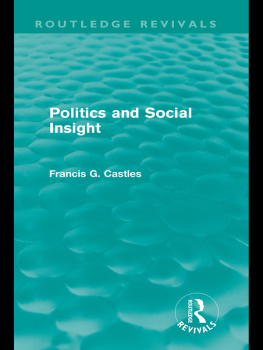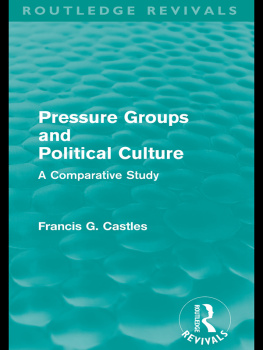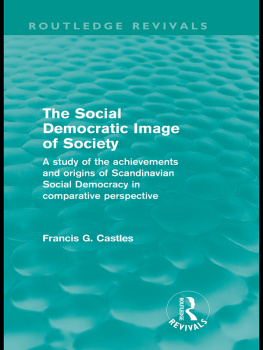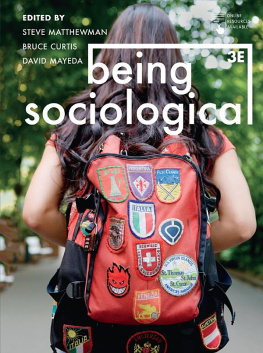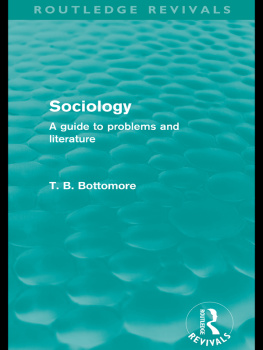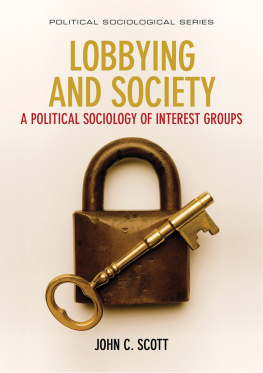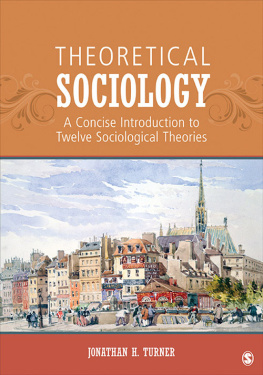Routledge Revivals
Politics and Social Insight
First published in 1971, this is a clear, straightforward introductory discussion of the importance of sociological knowledge, and particularly sociological theory, for the understanding of political life. The topics covered include sociology and the discipline of politics, the elementary forms of political life, and the relationship between theory, evidence and insight. Francis Castles also looks at functionalism and the analysis of conflict as sociological meta-theories, and at the idea of anomie and the theory of mass society. The book should be of prime interest to students of politics and to students of the social sciences in general.
First published in 1971
by Routledge and Kegan Paul Ltd
This edition first published in 2009 by Routledge
2 Park Square, Milton Park, Abingdon, Oxon, OX 14 4RN
Simultaneously published in the USA and Canada
by Routledge
270 Madison Avenue, New York, NY 10016
Routledge is an imprint of the Taylor & Francis Group, an informa business
This edition published in the Taylor & Francis e-Library, 2009.
To purchase your own copy of this or any of Taylor & Francis or Routledges collection of thousands of eBooks please go to www.eBookstore.tandf.co.uk.
1971 Francis G.Castles
All rights reserved. No part of this book may be reprinted or reproduced or utilised in any form or by any electronic, mechanical, or other means, now known or hereafter invented, including photocopying and recording, or in any information storage or retrieval system, without permission in writing from the publishers.
Publishers Note
The publisher has gone to great lengths to ensure the quality of this reprint but points out that some imperfections in the original copies may be apparent.
Disclaimer
The publisher has made every effort to trace copyright holders and welcomes correspondence from those they have been unable to contact.
ISBN 0-203-09229-5 Master e-book ISBN
ISBN 13:978-0-415-55751-1 (hbk)
ISBN 13:978-0-203-09229-3 (ebk)
ISBN 10:0-415-55751-8 (hbk)
ISBN 10:0-203-09229-5 (ebk)
Politics and social insight
By the same author
Pressure Groups and Political Culture (1967)
Politics and social insight
Francis G.Castles
Faculty of Social Sciences, the Open University
First published 1971
by Routledge and Kegan Paul Ltd
Broadway House,
6874 Carter Lane,
London, EC4V 5EL
This edition published in the Taylor & Francis e-Library, 2009.
To purchase your own copy of this or any of Taylor & Francis or Routledges collection of thousands of eBooks please go to www.eBookstore.tandf.co.uk.
Francis G.Castles 1971
No part of this book may be reproduced in any form without permission from the publisher, except for the quotation of brief passages in criticism
ISBN 0-203-09229-5 Master e-book ISBN
ISBN 13:978-0-415-55751-1 (hbk)
ISBN 13:978-0-203-09229-3 (ebk)
ISBN 10:0-415-55751-8 (hbk)
ISBN 10:0-203-09229-5 (ebk)
To Penny Ann
Sociology and the discipline of politics
An academic discipline may be defined in one of two alternative ways. Its focus of interest may be located in either a given method of study or a given set of phenomena as an object of study. These alternatives are not necessarily mutually exclusive, but there is a natural tendency for one or other approach to be predominant. To take as an object of study a particular area of human behaviour implies no specific method; only that every conceivable method or perspective appropriate to the illumination of that subject-area should be utilized. In contrast, the refinement of a particular method of study carries with it the implication that it will be used in all those areas where it may promote the advancement of knowledge.
There can be little question that politics as a discipline is of the type that concentrates its attention on a particular area of activity. However, the manner in which this area may be delimited at a given time depends considerably on the methods and perspectives which are currently thought appropriate for the explanation of political data. Thus in an era when politics is chiefly the concern of philosophers the definition of its area of competence comes to include not merely the mechanics of government, but also all those factors relevant to the conscious creation of a polis in which justice, the general will, or the principles of utility reign supreme. Similarly, the historians attempt to understand the world in terms of unique sequences of events brings to politics a concern with all those elements of human motivation which make the individual create history in his own image.
In recent times, a number of schools of thought within the discipline of politics have arisen, which, without necessarily having that intention, have severely limited the methods and perspectives avail-able to the discipline. One, which might be called the constitutionalist school has insisted that with the rise of new social science disciplines, the study of politics must restrict itself to a distinctive area of human activity, notably that of governmental behaviour. Although such an approach in no way logically precludes the utilization of a very wide variety of differing perspectives, the desire to preserve the integrity of the discipline of politics from the encroachments of other equally sharply defined disciplines in reality leads to an emphasis that political activity, and governmental activity in particular, can be explained from the very limited set of data pertaining to formal governmental institutions and a small number of other bodies, like political parties, clearly oriented in their behaviour to such institutions.
Another school, that commonly denoted by the term behaviouralist, introduces a further limitation by insisting that a dispassionate and highly empirical method, suggested to be the essence of science per se, is the only one appropriate to the study of political activity. The contention made by this school that the only way of searching into and discovering truth lies in a method deriving from the senses and particulars, rising by gradual and unbroken ascent, so that it arrives at the most general axioms last of all is by no means novel in the history of science, but has come to politics as a result of the recent development of data-gathering techniques.

